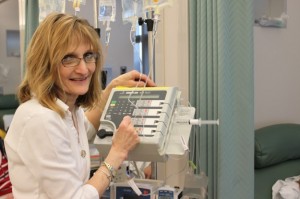***This post is written by Judith Minkove, editor of Inside Hopkins and senior writer at Johns Hopkins Medicine.
On any given day, as many as 170 patients pour into Weinberg 2’s outpatient infusion center for cancer treatments or blood products. Another 100 come in for follow-up visits.

One by one, patients are escorted back to one of six “pods,” where they will likely spend the next several hours hooked to an infusion pump. Nurses and techs scurry about in the open space, taking vital signs, changing i.v. bags whenever the pumps beep and keeping an open eye for sudden nausea.
Over in pod C, amid the cacophony from pumps, TVs and conversation, Jane Diaz is a sea of calm unto herself. The soft-spoken nurse, who has been a Weinberg outpatient caregiver since 1998 [full disclosure—she’s my daughter’s nurse], reviews incoming labs; then walks over to patients to explain what they mean.
If she perceives a puzzled expression, she’ll ask the patient if he or she understands. Then she’ll try to paint a clearer picture of how, for example, low potassium can spell trouble for heart muscles. And then Diaz shares the day’s plan. She asks the family if they need anything— a vacation perhaps? Laughter erupts.
At the end of the treatment, Diaz sits down with the patient and family members to review the next steps. The rapport builds with each visit. “I love what I do because of the patients I treat,” she says. “I’ve met an incredible number who have touched my heart.”
But there’s another reason she’s there. In 2001, Diaz’s husband died from a brain tumor at age 54. Well before that, at 33, he was diagnosed with leukemia. During those years, Diaz worked full time and raised two children. So, she adds, “I understand what patients are going through. Cancer is a scary place to be. I want them to know that we’re not a big, cold institution.”
And that she does with aplomb—explaining to patients how a certain drug might trigger severe itching, or challenging an insurer who questions a test. “We fight hard for our patients,” she says.
As oncologist Rich Ambinder’s primary nurse, Diaz stays in close touch with his lymphoma and leukemia patients. That means understanding the intricacies of standard and experimental treatments and knowing which drug interactions or side effects can prove life threatening.
Nurses like Diaz have unique challenges. "They're not only expected to know the mechanisms of each treatment,” says Sharon Krumm, Hopkins Kimmel Cancer Center’s director of nursing. “They must also help patients understand how to monitor themselves."
And, because cancer regimens can last for months or years, notes Krumm, the emotional toll can be high. "The stressful part is experiencing the dying process, perhaps more so because we're in an institution with clinical trials. Though new treatments might not work, we always hold onto hope. The balance hinges on hope and how it changes over time."
Because oncology nurses deal with patients over an extended period of time, dealing with a patient’s death is especially difficult. “We’ve all seen each other go off and cry,” says Diaz. Yet, the nurses give each other support to get through those emotional times.
Diaz says that besides the patients, what she most enjoys is her job’s diversity. In the course of one day, she administers chemo, orders blood products, consults with Ambinder, follows up with patients and ensures that they’re comfortable. Twice a week, Diaz serves as charge nurse for all six pods. She fields everything from walk-ins to faulty equipment.
Diaz’s trademark empathy earned her the 2010 Friends of Oncology Nursing Clinical Excellence Award for the outpatient department. The award recognizes outstanding, compassionate care. Diaz was cited for her "warm and comforting approach” and for being passionate about encouraging patients to participate in their care. The presenter also noted that Diaz comes in early or stays late for patients coming in from out of town and demonstrates an extraordinary level of knowledge.
As cancers require more repetitive treatments over longer periods of time, says Krumm, Weinberg 2 is bound to get even busier. That doesn’t scare Diaz. “No matter how busy we get,” she says, “I’ll always strive to make the cancer experience less imposing.”
Special thanks to Jane for her extraordinary care--and to the entire team for their support. Happy Nurses' Week! -- Judith Minkove